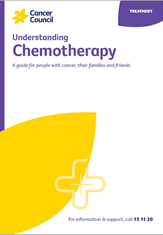- Home
- Lung cancer
- Treatment
- Chemotherapy
Chemotherapy for lung cancer
Chemotherapy is the use of drugs to kill cancer cells or slow their growth.
Learn more about:
- When is chemotherapy used?
- Having chemotherapy
- Side effects of chemotherapy
- Video: What is chemotherapy?
- Podcast: Making Treatment Decisions
When is chemotherapy used?
Chemotherapy can be used at different times:
- before surgery to try to shrink the cancer and make it easier to remove (neoadjuvant chemotherapy)
- before or in combination with radiation therapy to make radiation therapy more effective (chemoradiation), or in combination with immunotherapy
- after surgery to reduce the risk of the cancer returning (adjuvant chemotherapy)
- when cancer is advanced – to reduce symptoms and improve quality of life (palliative chemotherapy).
Drug therapies, also called systemic therapies, can travel throughout the body to treat cancer cells wherever they may be. This can be helpful for cancer that has spread (metastatic cancer). The main types of drug therapies used to treat lung cancer are chemotherapy, immunotherapy and targeted therapy.
Having chemotherapy
Chemotherapy is usually given through a vein (intravenously). It is commonly given as a period of treatment followed by a break to allow your body to recover. This is called a cycle. The number of cycles will depend on the type of lung cancer and any side effects you have. You will probably have chemotherapy as an outpatient, which means you will go to the treatment centre for chemotherapy but not stay overnight.
Some types of chemotherapy come in tablet form and can be taken by mouth (orally) at home. Ask your doctor about the treatment plan recommended for you.
Side effects of chemotherapy
Chemotherapy works on cells that are dividing rapidly. Cancer cells divide rapidly, as do some healthy cells such as the cells in your blood, mouth, digestive system and hair follicles. Side effects occur when chemotherapy damages these normal cells. As the body constantly makes new cells, most side effects are temporary. Some side effects are listed below.
Anaemia
A low red blood cell count is called anaemia. This can make you feel tired, breathless or dizzy. Your treatment team will monitor your red blood cell levels and suggest treatment if necessary.
Risk of infections
Chemotherapy drugs can lower the number of white blood cells that fight infections caused by bacteria. If you get an infection caused by a virus, such as a cold, flu or COVID-19, the risk of getting a bacterial infection is further increased. Talk to your doctor about being vaccinated against flu and COVID-19. Good hand and mouth hygiene and social distancing are also important measures to reduce the risk of infection. If you feel unwell or have a temperature above 38°C, call your doctor immediately or go to the hospital emergency department.
Mouth ulcers
Some chemotherapy drugs cause mouth sores, ulcers and thickened saliva, which make it difficult to swallow. Your treatment team will explain how to take care of your mouth.
Hair loss
You may lose hair from your head and chest, depending on the chemotherapy drugs you receive. The hair will grow back after treatment is completed, but the colour and texture may change.
Nausea, vomiting or constipation
You will usually be prescribed anti-nausea medicine with your chemotherapy drugs, but some people still feel sick (nauseous) or vomit. Constipation is also a common side effect of some types of anti-nausea medicines. Let your treatment team know if you have these side effects, as they may be able to give you additional medicines.
For more on this, see Chemotherapy, Mouth health and Hair loss, and listen to our podcast on Appetite Loss and Nausea.
→ READ MORE: Immunotherapy for lung cancer
Video: What is chemotherapy?
Watch this short video to learn more about chemotherapy.
Podcast: Making Treatment Decisions
Listen to more of our podcast for people affected by cancer
A/Prof Brett Hughes, Senior Staff Specialist Medical Oncologist, Royal Brisbane and Women’s Hospital, The Prince Charles Hospital and The University of Queensland, QLD; Dr Brendan Dougherty, Respiratory and Sleep Medicine Specialist, Flinders Medical Centre, SA; Kim Greco, Nurse Consultant – Lung Cancer, Flinders Medical Centre, SA; Dr Susan Harden, Radiation Oncologist, Peter MacCallum Cancer Centre, VIC; A/Prof Rohit Joshi, Medical Oncologist, GenesisCare and Lyell McEwin Hospital, Director, Cancer Research SA; Kathlene Robson, 13 11 20 Consultant, Cancer Council ACT; Peter Spolc, Consumer; Nicole Taylor, Lung Cancer and Mesothelioma Cancer Specialist Nurse, Canberra Hospital, ACT; Rosemary Taylor, Consumer; A/Prof Gavin M Wright, Director of Surgical Oncology, St Vincent’s Hospital and Research and Education Lead – Lung Cancer, Victorian Comprehensive Cancer Centre, VIC.
View the Cancer Council NSW editorial policy.
View all publications or call 13 11 20 for free printed copies.


